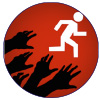BetterU

App of the month
Zombies, Run!
by Six to Start
 |
Ask the docDr. Davis Smith is an internist practicing in Connecticut and at Trinity College in Hartford. He specializes in the care of adolescents and GLBTQ patients. |
|---|
“Does walking on a cold floor without socks (or going outside without a coat/hat, etc.) increase your chances of getting sick?”
—Nelson A., Elgin Community College, Illinois
Honestly—probably not. We refer to this in the medical community as the “theory of chill.”
In fact, there’s some evidence that exercising in cold weather may decrease your chances of catching a cold. In one meta-analysis, there was a 50 percent decrease in the incidence of colds in patients, including marathon runners and skiers, who engaged in intense activity in extreme conditions, according to a 2013 study by the Department of Public Health at the University of Helsinki, Finland. Researchers are still unsure as to the reasons why the extreme conditions seemed to benefit these patients.
On average, adults will get two or three colds a year. Although the cause is probably not due to the cold weather, that doesn’t keep friends or family from saying “I told you so” when you catch a cold a few days after you didn’t wear your sweater outside. People tend to create correlations in their minds, even if it isn’t necessarily true. That’s just human nature.
We catch more colds in the winter months because we are in closer proximity to more people, says a 2009 review in Yale Scientific, a magazine published by Yale University undergraduates.
In addition, it is my untested and unproven opinion that the dry air in frequently overheated but under-humidified residence halls leads to dryness and irritation of the nasal passages and airways. This may make you more vulnerable to infection by viruses that cause colds.
If you’re really interested in not getting a cold or other illness, try washing your hands carefully, and avoid touching your eyes or mouth until you’ve washed your hands.
 |
Ask the professorAmy Baldwin, MA, is the director of University College at the University of Central Arkansas. |
|---|
“What are good strategies to get over writer’s block?”
—Amy W., University of New Brunswick
Hmmm…What can I say about writer’s block? Oh look, there are some funny cat videos I need to watch on YouTube.
In all seriousness, writer’s block affects everyone who has ever had to complete a writing assignment with or without a deadline. Some writers are good at jump-starting the writing process or realizing when they need to take a break. Others are good at creating a writing routine that keeps them on task and on time.
If you need some help getting over writer’s block, try these tips:
- Question yourself If you are having trouble finding the motivation for writing, ask yourself a few questions to get your motor running: Why is it important that I share what I know about the topic? How can my writing about this help others improve their own lives? If you can answer those questions thoughtfully, you can feel more confident that you must write.
- Be silly If you are not sure how to start a writing assignment, begin by writing something, no matter how silly it sounds. In fact, try to be silly. This will loosen up those rusty wheels in your brain and get ideas flowing. Flowing ideas will lead to other ideas that you can actually use for your assignment.
- Silence your inner critic When drafting, tell that inner critic (mine is named “Ralph” and has a big nose and thin mustache) to go away. Nothing shuts writers down faster than the inner critic who tells them that what they are writing is just plain dumb. Ralph wanted me to revise that last sentence, but I managed to ignore him. Let yourself write without judgment so you can get material down on the page. Invite your inner critic back when you are ready to edit.
- Ready, set, go Time yourself and write only for that short amount of time. Give yourself five minutes, for example, to write down everything you know about a topic. Stop when time is up and read what you have. Usually, you will have gotten some ideas worth working on and maybe even forgotten you had writer’s block.
- Ditch perfection Good writing is not perfect. As a composition professor, I wanted students to ditch the concern about pleasing me or writing something earth-shattering. “Just write something for me!” I would say. It is better to turn in an assignment than to miss a deadline because you don’t feel it is the best thing on the planet. Your professor can’t grade what you didn’t turn in.
 |
Ask the counselorSharon Sevier, PhD, LPC, is chair of the board of directors of the American School Counselor Association. |
|---|
“How do you know whether or not you have ADHD (ADD)?”
—Julieta A., Florida Atlantic University
To clear up some confusion: ADD (Attention Deficit Disorder) is an older term that’s no longer in clinical use but was common until the late 1980s. The same condition is now known as ADHD (Attention Deficit Hyperactivity Disorder), with sub-categories based on which traits are the most prominent.
ADHD is a common condition. It’s characterized by the inability to pay attention, impulsivity, and/or hyperactivity. These issues do not come and go. A person typically has a history of these problems that affect their daily functioning, though people may learn to compensate for those issues over time. Some people find that as their workload increases, their usual coping mechanisms are no longer effective; at this point, an assessment may be warranted.
Here’s what Student Health 101’s medical directors advice: If you are concerned you may have ADHD, discuss it with a medical or psychological professional. Your primary care provider or school health center is a good place to start. They may be able to assess you, or may refer you to another local provider. A variety of health care professionals can make this diagnosis.
A health professional who evaluates you for ADHD will likely ask you to fill out some rating scales about your behavioral traits. The results will help determine whether the behaviors are a way of life or are just occasional.
If you are diagnosed with ADHD, you may be prescribed medication to help manage your condition. A primary care physician may be comfortable handling your routine care. It can take some time, and even a few trials, to find the right medication and dosing to control your symptoms.
Common signs of inattention
- Inability to stay focused, especially when a task may be long and boring
- Failing to pay attention to details, leading to mistakes
- Difficulty listening when someone is speaking to you
- Being disorganized and losing things
- Having difficulty following through on assignments and tasks
Signs of hyperactivity
- Inability to sit still
- Difficulty performing quiet, sedentary activities
- Talking nonstop
Signs of impulsivity
- Impatience or difficulty waiting
- Talking or taking actions without thinking of the consequences
- Interrupting others’ conversations
The main thing to remember is that these issues must have been happening for a significant amount of time. We all have times when we don’t pay attention, or we lose things, or we fidget; that doesn’t mean we have ADHD. But if these indicators have been a part of your life for months or years, you might want to check with your doctor. Treatment for ADHD includes medication, environmental changes (such as creating a routine or limiting distractions), and academic accommodations. Accessing academic accommodations requires that you submit documentation of your initial evaluation.

Mind your mind
By Dr. Holly Rogers
Do you worry about your academic performance, job prospects, or where your relationship’s going? Are you worried about passing or failing, winning or losing?
The problem: Worrying about a certain outcome can get in the way of achieving it. The solution? Learning to stay mindfully in the moment.
“There is a lot of power in a thought. When I think, ‘I’m going to fail,’ my breathing changes, my heart accelerates, and I lose focus,” says a second-year undergraduate at Simpson College, Iowa (in a recent Student Health 101 survey).
How to reclaim your worried mind so you can perform better
In a recent survey by Student Health 101, students’ most common worries were related to their grades, job and career prospects, and finances. These are pragmatic and understandable concerns. We all have something we really want, like an A in math class. If you stress out—“I have to get an A; I’ll never get into grad school if I don’t”—you may be getting in the way of your own success.
Thinking too much about achieving a particular outcome can set you up to fail. George Mumford, a mindfulness trainer and coach who works with NBA stars and other high-level athletes, writes that “focusing too hard on winning can take your focus away from doing the things you need to do to achieve your desired result” (The Mindful Athlete: Secrets to Pure Performance, Parallax Press, 2015). In other words, you will win more if you think less about winning and more about playing. Keeping your head in the game means paying attention to what is happening right now, in this moment. Staying in the moment keeps you ready to respond to each challenge as it occurs.
This is not only true in sports. You’ll perform better in interviews, on assignments and tests, and in your personal life if you keep your attention focused on what’s happening right now rather than worrying about what you hope to achieve in the end. Next time you catch yourself worrying about an important result, use this exercise to get your mind back in the present. This way, you can be at the top of your game:
- Take a couple of deep, slow breaths.
- Spend a few minutes checking in with each of your five senses. What do you see, hear, taste, touch, and smell? Name each observation aloud if you can.
- Repeat this exercise as often as needed to keep your mind in the moment and on your game.
+ Build lifelong skills with Koru Mindfulness
Dr. Holly Rogers co-developed the Koru Mindfulness program for college students (currently available on more than 60 campuses in the US). Trials have shown that the Koru program is effective in helping students feel less stressed, better rested, more compassionate, and more mindful. Dr. Rogers is a psychiatrist at Duke University and co-author of Mindfulness for the Next Generation: Helping Emerging Adults Manage Stress and Lead Healthier Lives (Oxford University Press, 2012).

Contributor spotlight
Taylor Rugg is double majoring in “war, warfare, and the soldier experience,” and writing and rhetoric, at Hobart and William Smith Colleges in New York.
Which life experience changed you? “I studied abroad in Copenhagen, Denmark, for a semester. I came home as a more independent, confident person. I traveled to over 15 countries while I was abroad; going to Dublin was the only trip that I did entirely on my own. I learned that I could navigate by myself and that getting lost was only part of the adventure.”
Best wellness tip? “Try different things. It can take some trial and error to discover what works best for you with exercise, diet, productivity, etc. But if you can find something that you enjoy, then it is easier to eat healthier and manage your time.”
Student reporter internship
+ Info & how to apply
Student advisory board
Selected students from our diverse community of readers help shape SH101 content.
+ 2015 – 16 Student Advisory Board





